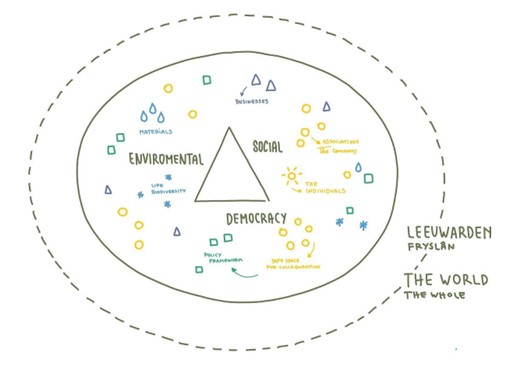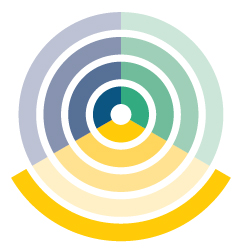Representatives, theorists and practitioners of future-fit economic models met at the Third International Conference of the Economy for the Common Good. Acknowledging the individual strengths of each model, we engaged in discussion and collaboration in search of synergies and a joint strategy. Together, we strive for a sustainable, inclusive, coherent, just, humane, participatory and inclusive economy. We want to continue this process through a range of events, projects, transition programs and future conferences.
Key notions from Converging Future-fit Economic models
We chose a values-driven economy, based on Deep Sustainability, Universal Care and Strengthened Democracy: ESD.
Deep Sustainability (E = Environmental, also in the picture below) means respect for the Earth. All resources can be equally enjoyed globally, within the ecological and social boundaries, while “meeting the needs of the present without compromising the ability of future generations to meet their own needs” (Brundtland 1987).
Universal Care (S = Social) implies caring for, as well as caring about all life on earth.
Strengthened Democracy (D) entails deep listening, intergenerational and transdisciplinary, so that just and safe spaces are created where everyone is heard and the earth is our mirror.
ESD focus in the Region, example Leeuwarden

Drawing by Paz Arando (key listener)
Advancing Just and Sustainable Regions
A shift in the collective mindset is required to find new answers to existential and moral challenges. We consider personal transformation a lever for regional societal and organizational transformation. Technological innovations should, out of principle, be in service of a values-driven, healthy, wellbeing-oriented economy. This transformation entails decolonization and gender justice.
We must reduce the overconsumption of resources and bring the economy back into harmony with the living world, while creating livelihood opportunities for all. Gross Domestic Product (GDP)-oriented growth exacerbates our environmental and social challenges. Instead, using ESD development as a compass in the region will enable an economy of appropriate scale to evolve, in which improving the well-being of all living creatures within planetary boundaries is the primary goal.
Monitoring environmental sustainability, social responsibility and strengthened democracy (ESD) in the regions will create space for ecological regeneration and meaningful and unique regional economies.
Self-organized communities in (bio-)regions and ecosystems are the generators and guardians of non-monetary area capital such as culture, health, mastery, a regenerative environment, human security and self-organization.
With a collective focus on creating enabling contexts for environmentally and socially sustainable regional economies throughout the world, the Global North and the Global South can begin to heal wounds and reconnect.
Call for action:
Governments and intergovernmental organizations are invited to:
- focus their general policies on the wellbeing of all forms of life, creating and using suitable success metrics for the common good.
- support regional communities and actors of all fields to organize themselves and create socially inclusive systems for the provision of basic needs. In every region in the world there are deeply rooted values and practices from which a well-being economy can emerge and strengthen.
- develop enabling environments for all stakeholders in eco- and bio-regions to reduce the overconsumption of resources, and bring the economy back into scale within regenerative capacities.
- use fiscal, procurement and other economic measures as a lever to reward the positive ESD impact of those organizations and institutions – civic, public and private. These legal incentives will lead to more realistic prices and to purchasing and investment decisions that favor green, circular and inclusive products and business models.
- reorient the monetary and financial system towards the democratically defined common good and provide sufficient funding for the transformation from the local to the global level.

Apollo 8 Mission 1968 (public domain)
Businesses and private sector organizations and institutions are invited to:
- adopt a new paradigm of success in the meaning of triple positive impact on regions: environmental, social and economic (= satisfying ‘needs’ rather than ‘wants’). These successes are published in standard reporting frameworks, such as the Common Good Balance Sheet. As a consequence, new models of organization and management will be spread that enhance regenerative area development, democratic governance, higher equality and more social justice.
- contribute to the creation of non-monetary area capital, measured in a regional wellbeing or common good index taking into account all stakeholders.
- contribute actively to the reduction of the overall social metabolism through the use of bio-based materials from the region where it operates, conscious changes in sales and marketing techniques as well as “slow” and “appropriate” technologies and revenue models..
- help Small and Medium Size Enterprises (SME) to transform through sharing knowledge, building networks and access to sustainable finance.
- support Common Good Start-ups with coherent innovations such as the Ecogood Business Canvas and positive impact plans.
Civil Society actors are invited to:
- position themselves freely and responsibly as the guardians of the Common Good in the region.
- adopt a mindset of sufficiency and step out of unconscious patterns of consumerism, and to prioritize sustainable companies for purchases.
- participate actively in decision making processes concerning socio-environmental plans for the regions, ensuring environmentally and socially sustainable practices, including public impact reporting.
- foster a culture of exploration of the self and of deeper consciousness.
- create networks and mobilize financial resources to transform individual empowerment into collective action through organized forms like associations.
Science and knowledge Institutions are invited to:
- develop knowledge-based inter-connections between different future-fit economic models (e.g. Economy for the Common Good, Doughnut Economy, Social and Solidarity Economy, Postgrowth models, True Price, Feminists Economics).
- disseminate stories of successful collective action and future knowledge for drinkable rivers, reforestation of the deserts and effective provision of basic needs.
- teach and develop deep listening and critical thinking skills among children, youngsters and students, including ethical reasoning, techno-critique (AI etc.) and media competence.
- help develop sensitive, sovereign and capable individuals, enabling them to enjoy a meaningful life, free from self-exploitation, productivity obsession and anxiety for money.
- define a transdisciplinary research agenda, involving diverse regional stakeholders, with the aim to develop new forms of collective decision-making that allow to find widely accepted solutions to the pressing challenges of the present.
- help to define new vocabularies and narratives linked to the real economy, to start building new sustainable futures, contributing with science to provide rigorous evidence and information.
Funders and Investors are invited to:
- shift their primary orientation towards increasing societal, environmental and human wellbeing, increasing the non-monetary area capital
- meet regulations to assure transparency, tax justice and the prevention of corruption through international agreements and a stronger global governance.
We call everyone to moral ambition and good ancestry!
This is the moment to make decisions for the Common Good, for our Common Home, the “Spaceship Earth”.

